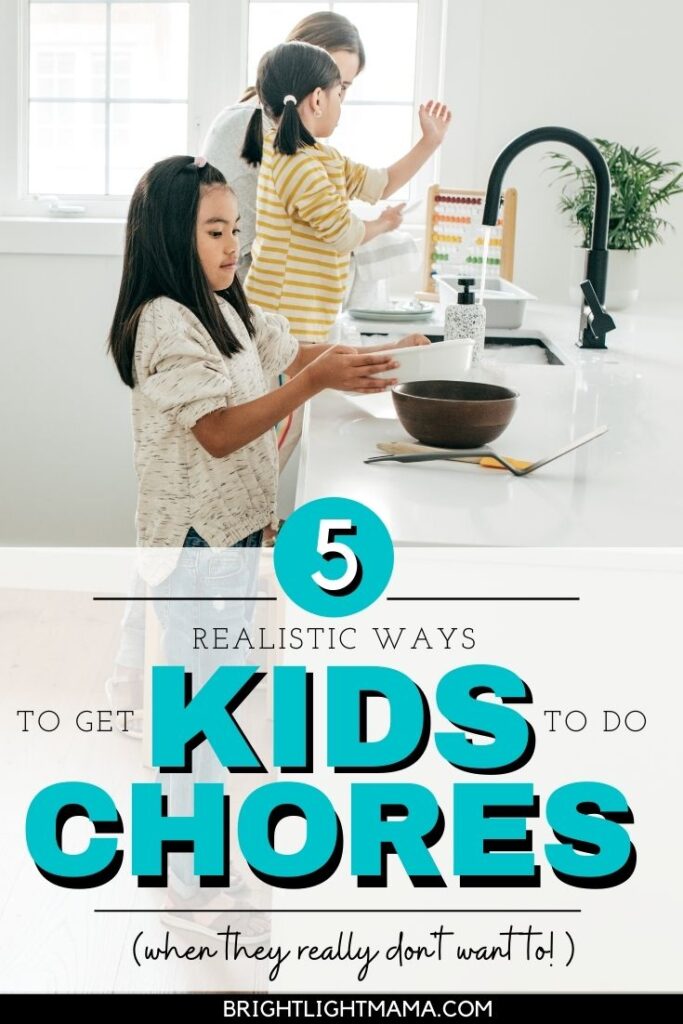“But Mom, I don’t waaaaant to take out the trash. Nobody else in my whole class has to chores. JUST me. It’s not fair!”
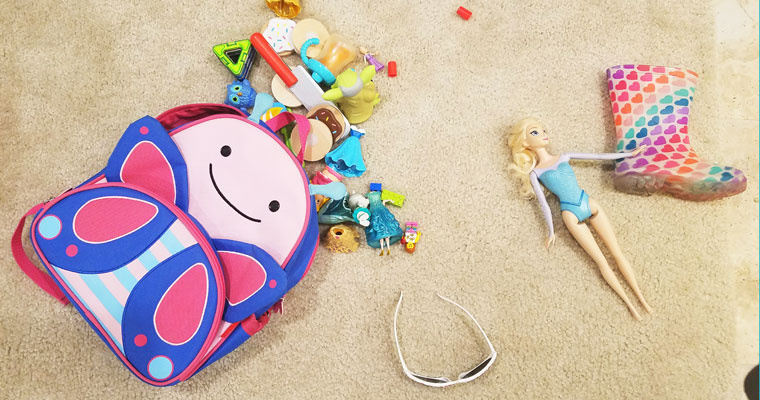
I’m sure you’ve never heard these delightful refrains when you try to get your kids to do chores. 😉 But if your kid ever did say something like that, well… Here’s where to start.
Honestly, whining and resistance are big reasons that in some seasons I give up and just let the house fall apart for a few days. But since chores are part of the growing-up curriculum in our home, I’ve found a handful of ways to get my kids a little more on-board with fulfilling their daily responsibilities. Today I’m going to share five ideas to help you defuse chore battles with your kids.
Get Kids to Do Chores (Without All the Complaining)
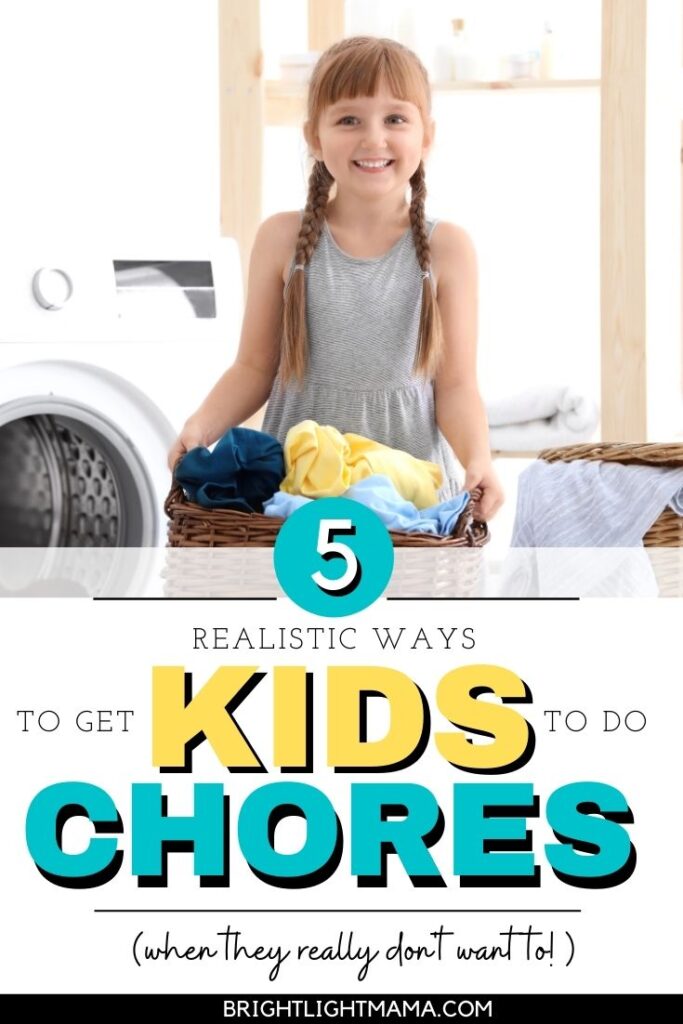
Honestly, whining and resistance are big reasons that in some seasons I give up and just let the house fall apart for a few days.
When you’re working so hard to create a healthy, happy childhood for your child, it can be incredibly discouraging to face resistance day after day.
But since chores are part of the growing-up curriculum in our home, I’ve found a handful of ways to get my kids a little more on-board with fulfilling their daily responsibilities.
Today I’m going to share five ideas to help you defuse chore battles with your kids.
1. Empathize
While I would love it if my kids leaned in to their chores and found the beauty in them, I don’t think that’s the most realistic dream–especially since I still have plenty of trouble doing that.
That’s why empathy is my #1 response to chore complaints.
If one of my kids tells me they hate loading the dishwasher, I am quick to confess that I don’t like it either!
Kids are people, too, and while we are hoping to help them grow into amazing, positive people, it’s also really wonderful for them to have feelings of anger, frustration, or even boredom validated and understood.
We don’t have to fix those feelings, but we can help our kids learn to understand and work through them themselves.
QUICK SCRIPT
Kid: Mom, I hate cleaning my room.
Mom: Yeah, I don’t like cleaning my room either! It’s just something we all have to do to keep our house clean. It helps me so much when you clean. Thanks for doing it even though you don’t like it!
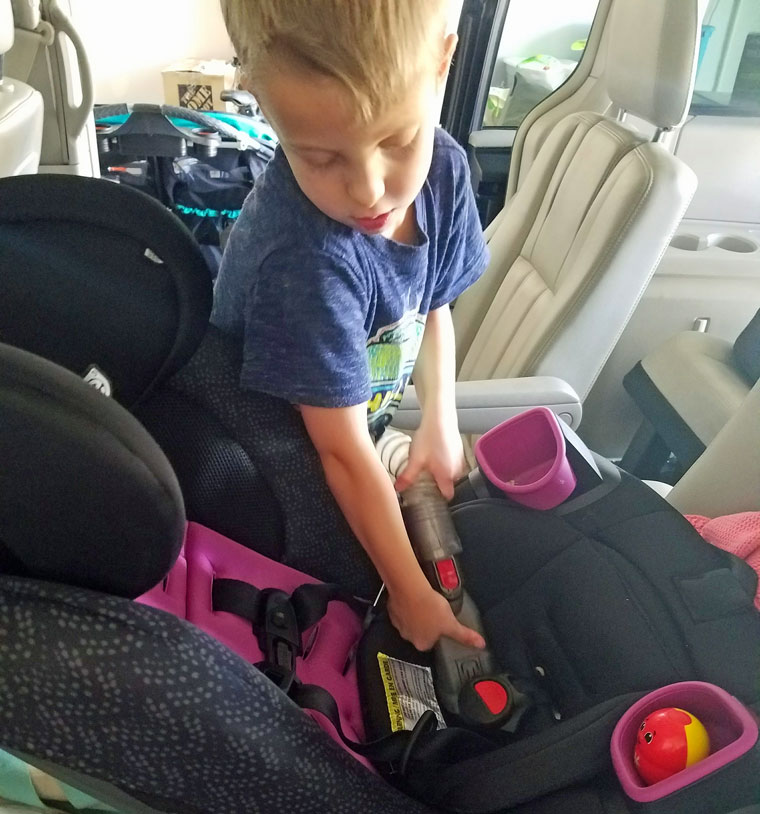
2. Teach and Re-Teach
Confession: I didn’t know there was a “proper order” to cleaning a kitchen until I turned 32. 32! (If you’re in that camp with me, I recommend this amazing and empowering book by Melissa Maker.)
For my whole adult life I’ve been zipping around like a crazed hummingbird: gathering, rinsing, tidying, sweeping, and wiping surfaces in no particular order. The kitchen got clean, sure, but it was exhausting every time.
Just as turning 18 didn’t magically give me all the secrets of adulthood, graduating from toddlerhood doesn’t mean our kids have any idea how to do a chore efficiently and effectively.
Saren Loosli, co-founder of Power of Moms, suggests “certifying” your kids in each chore they take on. She starts by making a checklist of what each chore entails, then walks her kids through each step. When they show her they can do it themselves, they are “certified” and the Looslis make a big deal out of how responsible and grown-up that is.
When their cleaning jobs start looking a little shabby, she goes over the checklist again with them a few times and they get “recertified.”
While we don’t do a full certification ceremony, I do sometimes make up a checklist, teach the chore, and check in when my kids need a refresher course.
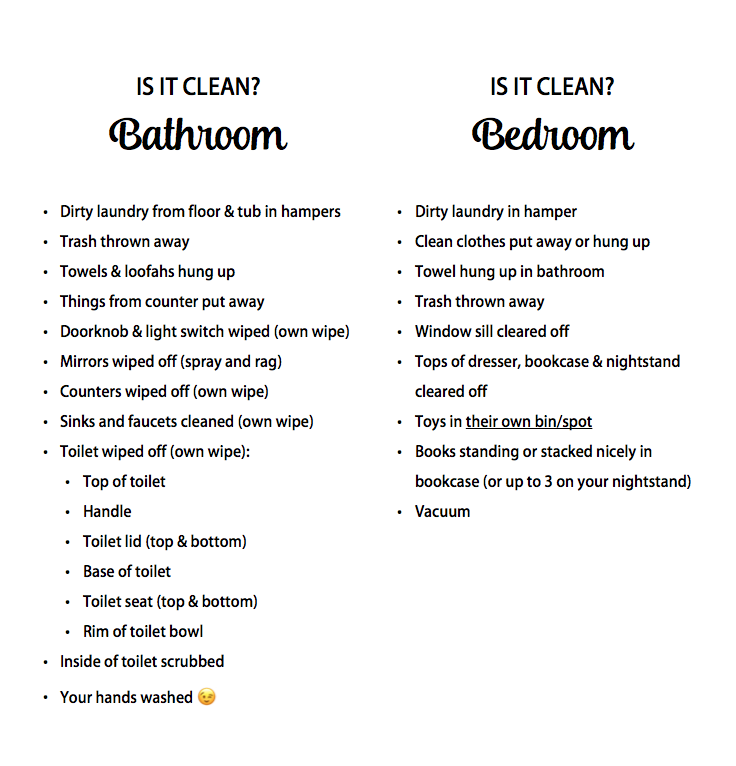
3. Make it Routine
Kids thrive on daily rhythms and routine–it gives them a sense of security in a world where many things still feel huge and unknowable.
(You may even have noticed that smaller children cling religiously to their routines–they might demand the same shirt every Wednesday, or need three very specific stuffed animals tucked in beside them before they will fall asleep!)
While older kids may be less zealous about the specifics, the American Association of Pediatrics says that they, too, do best when routines are “regular, predictable, and consistent.”
Use this natural tendency to your family’s advantage!
Building a regular chore time into your daily routine helps create a sense of inevitability and dependability that, over time, decreases kids’ resistance.
At our house, we do chores at 3:30 every school day, after they’ve wound down with a snack and some goofing off. They’re never excited about it, but it’s become such a regular part of their day that they almost never argue with it.
Consistency is key here–set up expectations and stick to them. When chores feel routine, it becomes less about getting the kids to do chores, and more about them expecting to have to do chores.
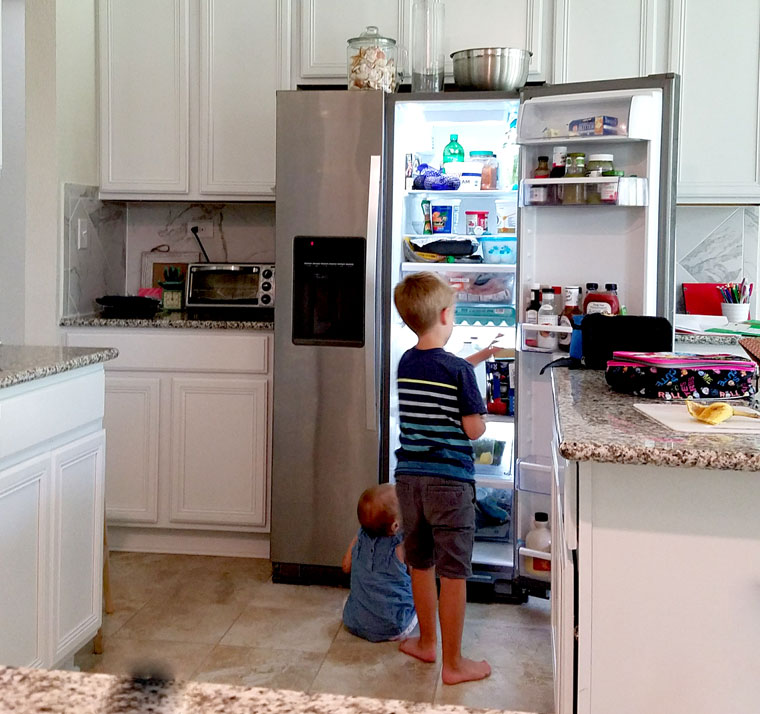
4. Play to their Strengths
When my husband and I clean together, he often offers to tackle the kitchen if I’ll do the family room. I’m super fast at pulling a haphazard room from post-kid-tornado to livable space, and he can whip a pile of dishes into shape in no time.
While we all end up doing chores we don’t love, I do try to give my kids some chores they enjoy:
- Through some miraculous twist of fate, both of my older kids like cleaning the bathroom, so they each “get”(?!?) to do a bathroom a couple times a week.
. - One of my kids likes having company 24/7, so our four-year-old often gets recruited to “assist” her on some chores.
. - Both big kids like having a say about what they eat for lunch, so they take turns packing lunches on weekdays.
Assigning my kids chores they like doing helps make the prospect of chore-time feel less a like burden and more like an opportunity to use their skills.
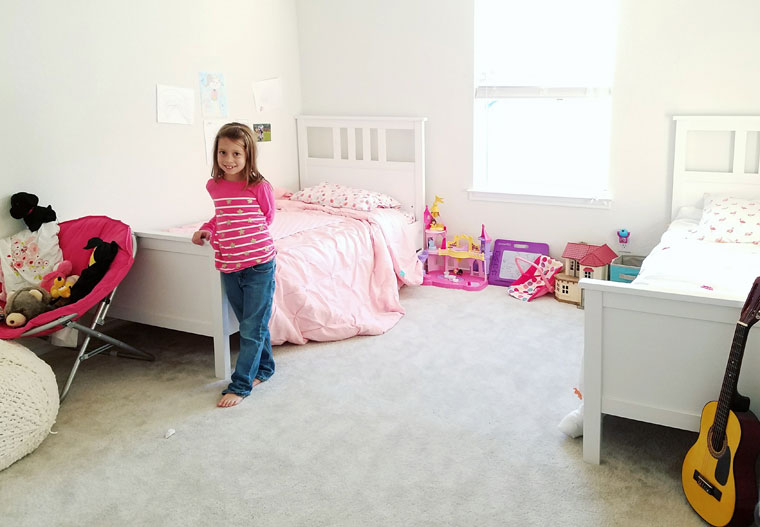
5. Incentivize
Some chores are just monotonous, no matter what you do. That’s why I’m more likely to pick up my own bedroom if I can listen to my favorite podcast–it turns something blah into almost a treat!
Why not do the same for your kids?
Crystal Paine of MoneySavingMom.com lets her kids watch TV while they fold laundry. At our house, I let my kids listen to a playlist of their favorite songs, or listen to audio storybooks while they work.
Yes, it might make the job go a little slower, but given the choice, I’d take a kid with a good attitude over a quick result any day.
6. BONUS: Let Go of Perfection
For those of us with neat-freak tendencies, it can be hard to turn over the cleanliness of our homes to our children. I 100% get that.
But imagine how you would feel if you parented your very best, and then your mom came in right behind you and “fixed” all the mistakes you’d made mothering your children.
It would hurt, right?
It would be beyond discouraging–it might even make you feel helpless, hopeless, and useless.
We don’t want to put our kids in that situation.
So, as you teach and encourage your kids to do chores, focus on letting them get things clean-enough.
Find a happy medium between your kids’ swipe-and-done version of “clean” and the squeaky-clean magazine-worthy daydreams we all suffer from.
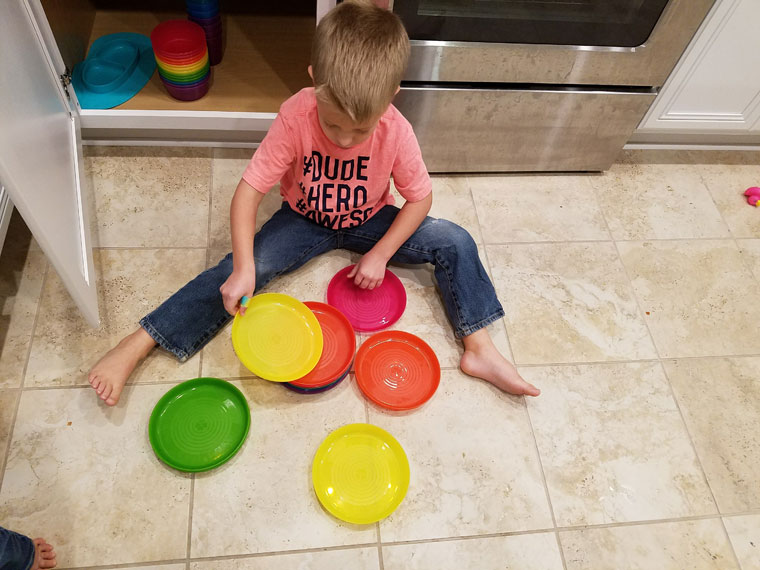
Let’s take this picture, for example. I guarantee I did not teach my kids to stack clean dishes on the kitchen floor–in fact, they hear from me pretty regularly about where plates (and food, dirty socks, etc.) belong!
But when my son decided on his own to organize all their dinnerware in rainbow order, I just let this happen where it happened.
I was grateful for his desire to make our home more beautiful!
This may not be the way I would have done it, but his contribution to our home has value just as it is–so I saved the lecture on perfect kitchen hygiene for when we’re cooking raw chicken or cracking eggs. 😉
When you can, let go of perfection and let “good enough” actually be good enough.
As always, I’m in the trenches with you, and I promise: you’ve got this, mama.
xo,
Jamie
